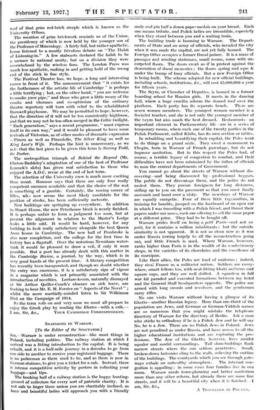SNAPSHOTS IN WARSAW.
[To the Editor of the SPECTATOR.]
Sin, Warsaw is under reconstruction—like most things in Poland, including politics. The railway station at which I arrived was a fitting introduction to the capital. It is being rebuilt, and it is a half-mile journey in a dorozka to go from one side to another to receive your registered baggage. There is no policeman as there used to be, and as there is now in German stations, to give you a ticket for a cab. Instead, there Is intense competitive activity by porters in collecting your baggage_and tips.
The booking hall of a railway station is the happy hunting- ground of collectors for every sort of patriotic charity. It is not safeto linger there unless you are charitably inclined, as busy and beautiful ladies will approach you with a friendly smile and pin half a dozen paper medals on your breast. Each one means tribute, and Polish ladies are irresistible, especially when they stand between you and a waiting train.
The building trade is booming in Warsaw. The Depart- ments of State and an aim* of officials, who invaded the city when it was made the capital, are not yet fully housed. The Foreign Office occupies a former Ducal palace. It is a maze of passages and winding staircases, small rooms, some with un- carpeted floors. The doors creak as if in protest against the desecration. of ducal memories ; the floors spring and sque .k under the tramp of busy officials. But a new Foreign Office is being built. The scheme adopted for new official buildings, including schools, institutions, &c., will cost £5,000,000 a year for fifteen years.
The Seym, or Chamber of Deputies, is housed in a former boarding school for Russian girls. It meets in the dancing hall, where a huge crucifix adorns the domed roof over the platform. Each party has its separate bench. There are seven women members. The youngest woman member is a Socialist teacher, and she is not only the youngest member of the Seym but also much the best dressed. Restaurants-- an important element in Parliamentary lift--are in a series of temporary rooms, where each one of the twenty parties in the Polish Parliament, called Kiubs, has its own section or tables.
In rebuilding and beautifying their capital, the Poles want to do things on a grand scale. They erect a monument to Chopin, born in Warsaw of French parentage, but do not improve sanitation. But in this respect the Poles had, of course, a terrible legacy of congestion to combat, and their difficulties have not been minimized by the influx of officials to. man the central departments of Government.
You cannot go about the streets of Warsaw without dis- covering—and being discovered by--professional beggars. The public do not discourage them, and the police do not molest them. They pursue foreigners for long distances, sidling up to you on the pavement so that you must finally succumb and hand over a zloty. The newsboys of Warsaw are equally energetic. Four of these little ragranullins, in training for bandits, jumped on the footboard of an open car in which I was travelling with a Polish friend, and thrust their papers under our noses, each one offering to sell the same paper at a different price. They had to be bought off.
Warsaw prides itself on being a petit Paris—and not so petit, for it contains a million inhabitants ; but the outside similarity is not apparent. It is not so clean now as it was under Russia (owing largely to all the reconstruction going on), and little French is used. Where Warsaw, however, ranks higher than Paris is in the wealth of its confectionery shops, in the varieties of its chocolates and the excellence of its marzipan.
Like their allies, the Poles are fond of uniforms ; indeed, they riva: France as a militarist nation. Soldiers are every- where, smart fellows too, with neat-fitting khaki uniforms and square caps, and they arc well drilled. A squadron in full war kit paraded and executed formations between my hotel and the General Staff headquarters opposite. The police are armed with long swords and revolvers, and the gendarmes carry rifles.
• No one visits Warsaw without having a glimpse of its Ghetto—another Russian legacy. More than one-third of the population are Jews, and German or German-Yiddish names are so numerous that you might mistake the telephone directory of Warsaw for the directory of Berlin. Ask a man who sticks to orthodoxy if he is a Polish Jew and he will say No, he is a Jew. There are no Polish .Jews in Poland. Jews are not penalized as under Russia, and have access to all the higher educational institutions and arc capturing the pro- fessions. The Jew of the Ghetto, however, lives amidst squalor and sordid surroundings. Tall slum-buildings flank narrow streets where the sun seldom penetrates. Small, broken-down balconies cling to the walls, relieving the outline of the buildings. The courtyards which you see through gate- ways exhale an unhealthy atmosphere. The internal con- gestion is appalling ; in some cases four families live in one room. Warsaw needs town-planning and better sanitation more than any other reform, but already there arc some fine streets, and it will be a beautiful city when it is finished.--I am, Sir, &c.,
• A TRAVELLER IN Poi Axe,










































 Previous page
Previous page